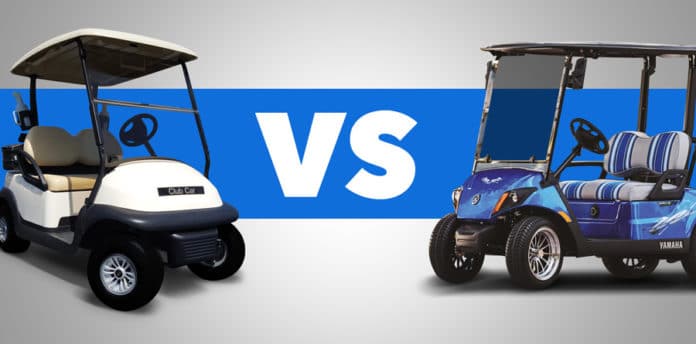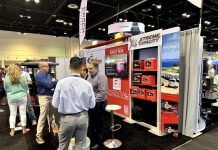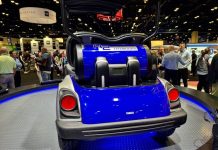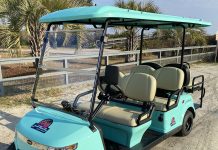
If what you like to drive on the golf course has to be plugged in, this article is not for you. However, if you consider plugging-in an electric cart after each use a nuisance, then this head-to-head comparison will make very interesting reading.
We’ve pitted the newest gas-powered cart from both industry veteran Club Car and relative newcomer Yamaha (when compared to Club Car). Both have a lot of excellent similarities, yet both have some rather dramatic differences. Club Car has a brand new Tempo model and Yamaha offers the new QuieTech EFI.
It is commonly known that electric carts are almost totally quiet, like a Prius you can take on the course. Gas powered carts do make noise, but Yamaha indicates their new QuieTech has the lowest decibel level of any gas cart on the market (Interesting Video Demonstration Here). That’s a substantial claim, which they say results in noise comparable to an electric cart. We’ll see how that works out in reality, but it is a feature that could give them a decided advantage.
Another Yamaha feature that bears mentioning is the first independent rear suspension on a production golf cart. That should provide the smoothest ride in the marketplace. The Club Car Tempo has a standard suspension arrangement.
DEALER LOCATOR: Find a Yamaha Dealer Near You
Yamaha also claims it has improved its gas efficiency by 25%, which brings the miles per gallon number up to 45. Again, a strong advantage, although all gas carts offer a pretty impressive range without a very expensive battery package under the seat. Yamaha also promises their engine is better for the environment because it produces less hydrocarbon emissions.
The story is not all about Yamaha’s advantages though, because Club Car has some other pretty spectacular stats. For example, top speed on a Precedent cart is 19 mph, while a Yamaha will only get to the 15 mph level, and that is pretty standard for a typical gas or electric cart. Both the Club Car Tempo and Precedent boast a 404cc engine with an overhead cam, versus the 357cc engine that comes in the Yamaha. Both models have electronic fuel injection.
Club Car comes with a standard rust-proof aluminum frame that has a lifetime warranty. The Yamaha has a hybrid core robotically-welded steel frame, which is stronger than aluminum but can rust in a coastal or high-humidity climate. To their credit, Yamaha does include electrostatic coating on the undercarriage, which lessens the chance of the steel rusting.
DEALER LOCATOR: Find a Club Car Dealer Near You
Size wise, both manufacturers create carts that will easily fit into your cart garage or the cart barn at the club. The Yamaha weighs in at 720 pounds and is 93.6” long, 47.3” wide and 70.2” high. The Club Car is a little more compact at 642 pounds with a length of 91.5” and a height of 68.5”. Both carts have excellent exterior styling and paint, rack and pinion steering and comfortable seats.
The list of optional accessories will make you think you are buying a car. You’ll find a plethora of various choices from wheel covers, lifted models, street-ready versions, windshields and built-in coolers. Club Car also offers Club Car Connect – basically an electronic screen that can be programmed to show course information, entertainment to occupy you while you are waiting for the group ahead and (of course) advertising for you, the captive audience.
Here’s a quick look at the competing specifications. Prices are pretty comparable, so it may be time to visit a dealer for a test drive and do your own comparison checklist. Either way, you can be driving down the fairways or your neighborhood in high style. What are your thoughts?
| Gas Specs | Yamaha | Club Car |
|---|---|---|
| Engine Size | 357cc | 404cc |
| Top Speed | 15mph | 19mph |
| Suspension | Independent Rear | Standard |
| Engine Noise | Lowest Decibel | Standard |
| MPG | 25% to 45mpg | Standard |
| Frame | Steel | Aluminum |
| Frame Warranty | 4 Years | Lifetime |
| Weight | 720lbs | 642lbs |
| Emissions | Claims Reduced | Standard |
Yamaha Quietech Video








Yamaha has a 357cc engine. Not 375. and the factory speed setting for a Yamaha PTV is 19 mph
If you want to turn up the Drive2 EFI Cars it can be done at the time of the purchase. Yamaha does not recommend anything over 20 mph.
Yamaha ptv easily goes 27 mph And the fleet does 19 with no problem
This really answered my downside, thank you!